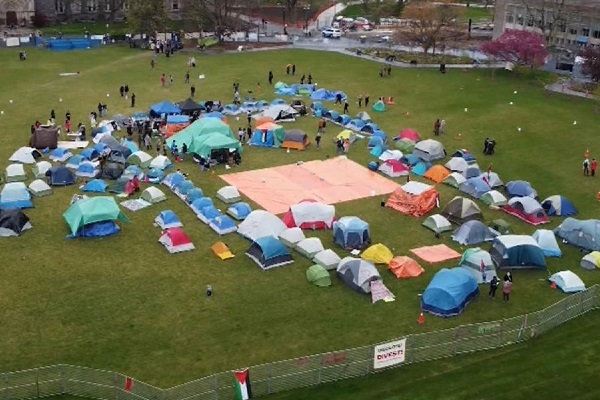Canadian University Issues Trespass Notice to Pro-Palestinian Protesters

The university administration has warned that those who remain could face serious consequences, including up to a five-year suspension or expulsion.
Additionally, the university has threatened faculty members and staff who have participated in the pro-Palestinian encampment with disciplinary measures, including termination of employment, according to Canadian media outlets.
The university's decision comes after the encampment, established on May 2, demanded that the institution sever ties with Israeli universities and companies profiting from the war on Gaza.
While the administration declined this demand, it has committed to forming a group to explore disclosure and investment options.
Read More:
Despite the trespass notice, protesters remain steadfast.
Erin Mackey, an encampment spokesperson, asserted, "We'll continue to be here, and we'll continue to demand divestment."
Encampment organizer Kalliope Anvar McCall, a fourth-year student, characterized the situation as an ultimatum, accusing the university of attempting to coerce acceptance of unfavorable terms by threatening eviction.
However, there are indications that negotiations may continue, as the National Post reported that an encampment organizer claimed the administration agreed to meet on Sunday.
The University of Toronto, with nearly 62,000 students, is not the only institution affected. Similar encampments have sprung up at other major Canadian post-secondary schools, including the University of Ottawa, the University of British Columbia, and McGill University.
The University of Toronto's response to the pro-Palestinian encampment has sparked controversy and raised questions about freedom of expression, campus policies, and the delicate balance between security and dissent.
Read More:
Demonstrations expressing support for Gaza have emerged at universities across the United States starting in April. These student-led protests are advocating for a range of actions from their universities, including an official endorsement of a ceasefire in Gaza, the cessation of financial investments in Israeli businesses and military suppliers, and the severance of academic relationships with Israeli educational institutions.
The movement has gained international traction, prompting parallel protests in the United Kingdom, various European countries, India, and Lebanon.
Beginning on April 18, following the arrest of 108 students at Columbia University, numerous educational institutions have enlisted law enforcement to dismantle the protest camps. This has led to over 2,600 arrests on upwards of 50 university campuses nationwide, as per the latest figures reported by the Associated Press.
The protests come as the Israeli regime's attacks on the besieged Gaza Strip since October have killed nearly 35,000 Palestinians, most of them women and children. The aggression has displaced almost all of the 2.3 million people in Gaza.
Source: Agencies



